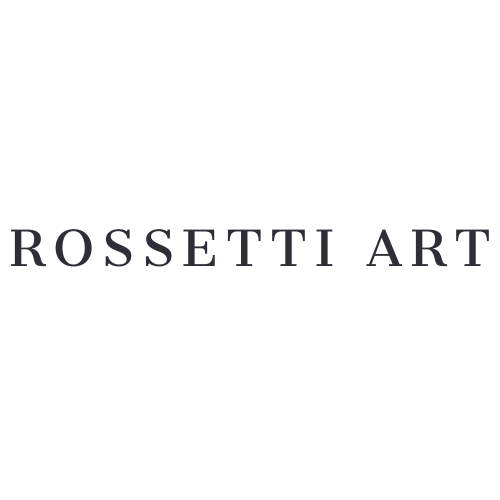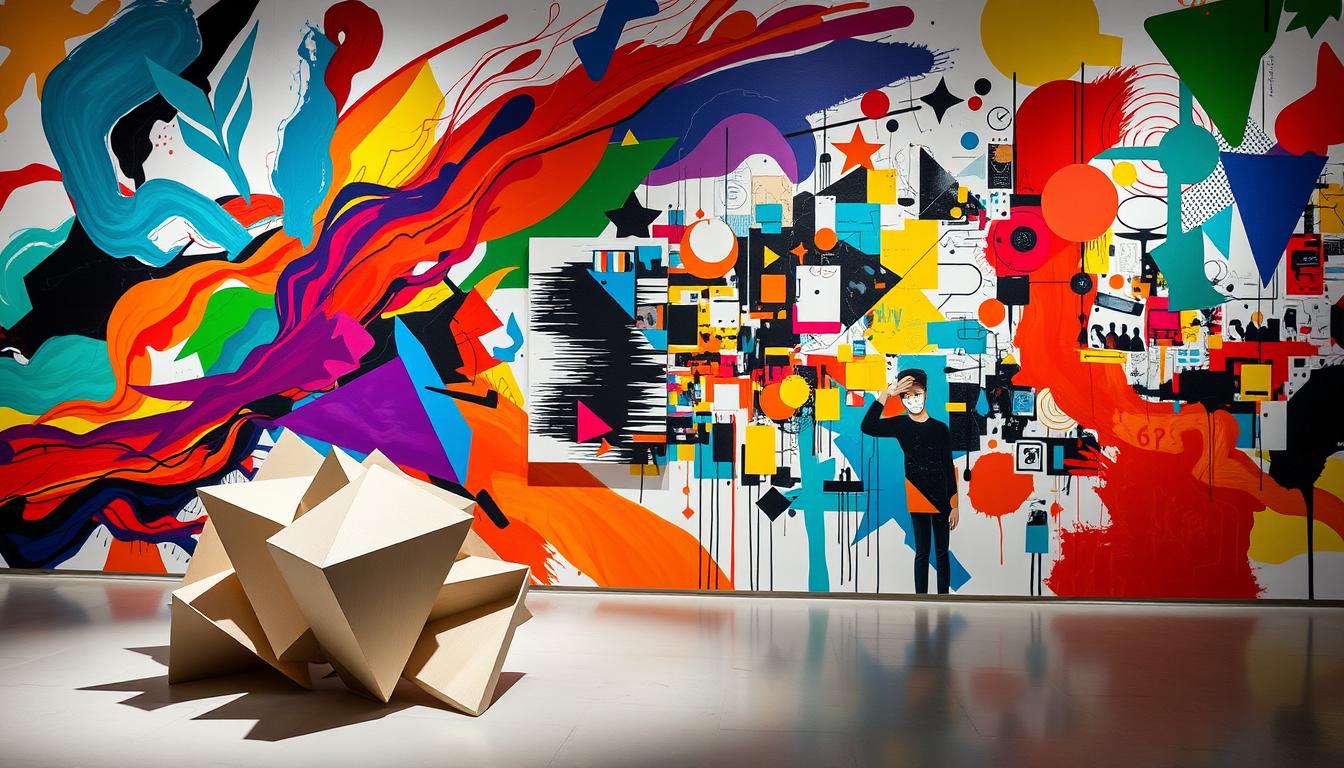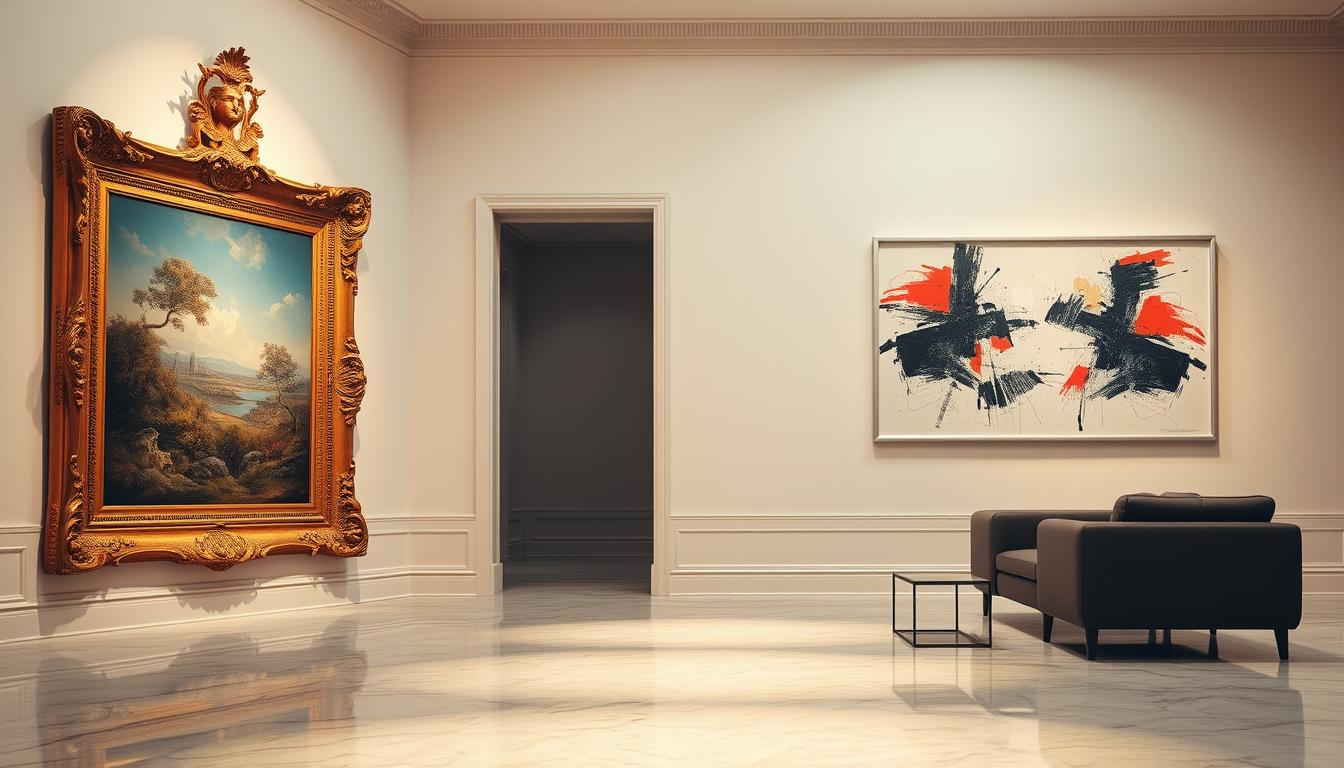Can a single wall transform a room and tell your story? The most talked-about direction blends digital innovation with tactile texture, giving wall art that feels current and timeless.

Oversized abstracts, softened Art Deco lines, ripple textures and ceramic-inspired surfaces are anchoring interiors in 2025. Warm minimalism and earthy palettes—burnt sienna, clay, olive and ochre—make spaces feel lived-in, not staged.
Buyers favor relaxed gallery walls and prints that carry personal meaning. Minimalist, nature-inspired and digital pieces lead online demand as contemporary styles reach new collectors across markets.
For a forward pulse, Dulux’s Rhythm of Blues will refresh 2026 palettes, layering easily with earth tones. This guide will map trends, show styling tips for small and large walls, and help you choose pieces that last.
Key Takeaways
- Texture meets tech: digital and tactile works top current interest.
- Scale matters: oversized prints create instant focal points without clutter.
- Warm, crafted looks: handmade details and earthy hues feel timeless.
- Meaningful choices: buyers pick story-led pieces over filler.
- Online discovery: collectors find contemporary voices and new prints easily online via sources like 2025 trends into 2026.
Today’s art landscape at a glance: how people, tech, and design shape the art world now
A lively mix of code and clay reshapes gallery floors and living rooms alike. Digital platforms let collectors find new voices from every region, and that access fuels fresh trends across markets.
Artists use AI, AR, and VR alongside hand-thrown ceramics, textiles, and mixed media. This blend keeps tactile delight in focus while expanding how works are made and shown.
The broader change comes from access: social feeds and marketplaces move ideas fast. Emerging creators from Africa, Asia, and Latin America bring new narratives into galleries and homes.
- Connections: platforms let people discover global designs in real time.
- Hybrid creativity: tech and craft fuel surprising, adaptable works.
- Flexible formats: prints to originals make testing style simple.
Interiors follow these moves with layered surfaces, textured finishes, and relaxed curation. The result is versatile style that adapts as color, furniture, or mood shifts during the year.
What art is trending right now?
Digital creativity and tactile abstraction now lead buyers toward flexible, expressive wall choices.
Digital and abstract wall art: innovation meets emotion
Digital art appeals to Millennial and Gen Z buyers for its customization and contemporary energy.
It works well on screens and as premium canvas prints, offering formats that suit any room. Abstract styles invite personal interpretation so a piece feels expressive without clashing with furniture.
Minimalist and nature-inspired pieces for calm, modern spaces
Minimalist wall art—line drawings and tonal abstracts—reduces visual noise and opens small rooms.
Searches for nature wall art have grown; botanicals, coastal scenes, and misty landscapes add a restorative vibe that pairs nicely with indoor plants.
Personalized artwork and custom designs with story and meaning
Custom photography, star maps, and portraits let buyers weave memory into a home. Platforms like Etsy, Pinterest, and Instagram have driven demand for one-off prints and tailored pieces.
Style tip: pick one hero piece and layer smaller works over time for a collected look.
| Style | Best format | Why it works | Scale advice |
|---|---|---|---|
| Digital & Abstract | Canvas, framed print, screen | Flexible formats, emotional range | Large focal or single-panel |
| Minimalist & Nature | Framed print, series of small prints | Calming, pairs with earthy palettes | Small sets or medium single |
| Personalized | Custom print, photo canvas | Story-driven, highly personal | Scale to room and memory |
Market shifts powering today’s trends
Digital discovery has collapsed distance between makers and buyers, speeding tastes across borders.
Online growth now drives a larger share of global sales, so contemporary and digital art reach collectors faster than before.
Young buyers favor flexible formats. Small prints, limited canvases, and transparent pricing lower the barrier to start a collection.
Online growth, new collectors, and the rise of contemporary and digital art
Marketplaces and social channels let people preview scale, framing, and room placement before they buy. That visual clarity builds confidence.
Price transparency and varied formats help first-time buyers make thoughtful purchases and grow a collection over time.
Global voices: emerging artists from Africa, Asia, and Latin America
Creators from diverse regions bring new materials and narratives that reshape tastes in the wider world.
- They add cultural depth and fresh styles that galleries and online shops now showcase.
- Social proof—studio clips and collector photos—translates texture and craft into purchase confidence.
- As these categories gain traction, interiors adopt pieces quickly via prints and adaptable formats, matching trends 2025 that prize authenticity and emotional resonance.
| Market Driver | Effect on Buyers | Interior Impact |
|---|---|---|
| Online discovery | Faster exposure to new artists and styles | Trend-driven pieces appear in homes sooner |
| Younger collectors | Prefer contemporary, digital formats | Flexible, tech-forward displays and screens |
| Global creators | Diverse materials and narratives influence demand | More eclectic, craft-focused styling choices |
Interior art trends 2025-2026: styles, materials, and scale for your walls
Walls become curated stages for softened Deco motifs, ripple finishes, and oversized focal prints. These moves help a living area feel personal without clutter. Pick elements that read as handmade and modern at once.
Art Deco reimagined
Choose designs with softened geometry and clean lines so a wall feels elevated, not formal. Metallic accents work best when paired with natural textures for subtle glamour.
Textural softness
Pleats, ripples, and fabric-like finishes add movement as light shifts. Use framed prints that mimic texture to gain tactile depth without bulky mounts.
Ceramic energy and oversized statements
Pick artwork that echoes glaze tones and vessel motifs to add handmade charm. When in doubt, let one oversized piece anchor the room; it balances furniture and creates instant focus.
Warm minimalism and relaxed galleries
Layer gentle neutrals and brushwork for calm warmth. For gallery walls, mix frames and rotate supporting prints over time to keep a home feeling collected and lived-in.
Explore more on top wall art trends.
Technology-led creativity: AI, AR/VR, and digital collectibles
Hybrid pipelines put software and studio side by side, widening how visuals and textures develop. This shift makes digital art a practical option for homes and galleries. It also reshapes how creators plan, make, and share work.
AI-assisted practice and authorship
AI speeds ideation: artists use models for mood boards, color studies, and texture experiments before adding hand detail.
That workflow keeps the human touch while accelerating choices. Ownership questions follow: attribution must note tool roles and human edits to keep trust clear.
AR/VR experiences for context and access
AR layers add sound, making-of clips, or provenance notes when a viewer scans a piece, raising the room’s energy.
VR tours let collectors walk a show, judge scale, and compare styles without travel. This broadens access and helps buyers picture works in their space.
Digital collectibles with utility
Smart contracts now deliver transparent royalties and token-gated events that reward collectors and sustain creators. These systems help artists earn ongoing income and build communities.
| Tool | Benefit | Home use | Ownership note |
|---|---|---|---|
| AI | Fast ideation, texture studies | Editable prints, screen displays | Credit human editor + model |
| AR | Layered storytelling | Scan-revealed audio or clips | Document provenance |
| Smart contracts | Royalties, community perks | Token access to events | Transparent revenue share |
Practical tip: mix screens and framed pieces so technology supports the room rather than overwhelms it. Document process and materials—even for digital-first works—to preserve narrative depth and buyer confidence. In trends 2025, the best outcomes come when creativity blends code with clear design intent.
Materiality and craft: from mixed media to handmade works
Combining fabric, metal, and paint gives walls a sensory vocabulary that photos can’t capture. Mixed media blends wood, light, and sound with traditional surfaces to create true multi-sensory depth.

Mixed media that rewards in-person viewing
Define it simply: mixed pieces combine diverse materials so a viewer discovers texture, shadow, and scale in person. Give these works breathing room on a wall so edges and relief read cleanly.
Handmade appeal and practical tips
Handcrafted artwork shows brushstrokes, slight asymmetry, and process marks that add warmth to clean decor. Choose designs with one dominant material to keep a piece coherent.
- Light-reactive surfaces like mica or metallic leaf reveal shifts as light moves.
- Heavier works need anchors or standoff hardware; avoid direct sun for delicate fibers.
- Prefer reclaimed wood, natural dyes, or recycled metals to link craft with sustainability.
Collect from artists who share process notes so you know care and longevity. Material choices turn a flat wall into layered experience without losing style.
Cultural and social currents shaping art today
Global narratives and local actions merge in works that ask viewers to care for places and people alike. Creators respond to climate pressure by choosing recycled media, natural dyes, soil mixes, and water-based processes.
Climate-focused practice and living works
Some pieces are designed to change or dissolve over time, or to trigger actions like tree planting and ocean cleanup. Display eco-driven works away from harsh light and document the artist’s intent when works evolve.
Cultural fusion and street practice
Cross-regional motifs and layered symbols give works deep meaning. Street practice now moves from alleys into institutions, using mapping, stencils, and projection to keep raw energy while gaining scale and precision.
Wellbeing through creative practice
Quiet palettes, soothing textures, and mindful marks support calm in schools, clinics, and homes. Choose styles with smooth gradients and soft edges for bedrooms and workspaces to reduce stress.
- Display tips: respect organic fragility and avoid direct sun.
- Provenance matters: a piece’s story often matters as much as surface beauty.
- Mixing strategy: pair a bold statement with quieter companions to keep a room peaceful and engaging.
Color and styling cues for 2026 and beyond
Blue families from Dulux’s Rhythm of Blues make it easy to update a home without a full remodel.

Rhythm of Blues: layering mellow to vibrant blues with earthy tones
Mellow Flow, Slow Swing, and Free Groove cover calm to lively moods. Use blue gradients in prints to bridge terracotta, oak, and ochre so the whole space reads cohesive.
Styling moves: scale, balance, and mixed styles across rooms
Aim for art that spans 60–75% of a sofa or console width to keep balance in a room. Anchor a living area with one blue-forward piece, then layer smaller earth-toned companions to link designs across zones.
- Mix matte and glossy finishes on walls to add quiet dimension.
- Combine arcs and soft geometry with delicate lines so the eye flows naturally.
- Test Mellow Flow in bedrooms and Free Groove for energizing entries.
- Swap prints seasonally for a low-risk color refresh.
Frame tones—natural wood, black, or brass—can tune warmth or coolness while keeping overall style consistent. For gallery walls, keep spacing steady and vary sizes; a rhythm of small-to-medium pieces can make tight space feel broader.
Conclusion
Choose pieces that match how you live. Pick a hero piece to set tone, then layer smaller prints and companions so adjacent spaces feel linked without crowding the wall.
Ideas that balance trend and longevity win. Use prints to test palettes, materials, and scale before committing to heavier works or custom pieces.
Look ahead to softened Deco geometry, textural softness, ceramic-inspired surfaces, and warm minimalism—these trends 2025 will shape home decor while leaving room for personality and meaning.
Whether ’re styling a studio, whether ’re refreshing a living area, whether ’re curating a first collection, whether ’re upgrading frames, keep experimenting. The best artwork has character, warmth, and depth; that energy helps a home grow with you.
Enhance Your Space with Unique Modern Masterpieces
Are you inspired by the innovative mediums and conceptual depth highlighted in our exploration of contemporary art? You’re not alone! Today’s art enthusiasts are seeking cultural relevance and emotional connections in their artwork. However, finding pieces that resonate with modern themes and fit your unique style can be a challenge. That’s where we come in!
At Rossetti Art, we specialize in canvas prints, original paintings, and modern sculptures that celebrate the spirit of now. Each piece created by Chiara Rossetti brings a personal touch that connects deeply with current social narratives—just like the modern masterpieces discussed in the article. Don’t miss out on the chance to elevate your home decor with breathtaking artwork that speaks to your values and aesthetic. Explore our collection today and find your perfect piece! Act now, and transform your space into a gallery of inspiration!
FAQ
What major trends are shaping the contemporary art scene?
Today, three forces shape the scene: digital innovation, global voices, and material craft. AI tools and AR/VR expand creation and display. Collectors and audiences from Africa, Asia, and Latin America bring new perspectives. At the same time, mixed media and handmade works keep tactile, human-making alive.
How do digital and abstract wall pieces fit into home design?
Digital and abstract prints add emotional depth and movement to walls. They work well as focal points in living rooms or offices, especially when paired with clean lines and neutral furnishings. High-resolution prints, framed giclée, and backlit panels translate digital work into cozy, gallery-grade decor.
What makes minimalist, nature-inspired pieces so popular?
Minimalist and nature-driven pieces offer calm and clarity. Subtle palettes, simple shapes, and organic textures bring balance to busy lives. These works pair easily with warm minimalism — layered neutrals and gentle brushwork — making rooms feel restful without losing character.
Can I commission personalized artwork that tells a story?
Yes. Many artists and studios offer custom commissions, from portraits to abstract pieces that reflect personal memories or travel. Look for artists with clear process descriptions, timelines, and contract terms. Custom work adds unique meaning and fits your space exactly.
How has the market shifted for collectors and contemporary buying?
The market has moved online, with platforms making discovery and purchase easier. New collectors enter via accessible prints and digital collectibles. Contemporary and digital works now enjoy broader visibility, while auction houses and galleries adapt hybrid sales models.
Which regions are producing notable emerging artists?
Artists from Nigeria, Kenya, India, South Korea, Brazil, and Mexico are gaining international recognition. These creators blend local traditions with contemporary forms, enriching the global conversation and expanding what collectors seek.
What interior trends will influence walls in 2025–2026?
Expect reimagined Art Deco lines, textural softness like pleats and ripples, ceramic wall pieces, and oversized statement works. Warm minimalism and earthy palettes — sienna, clay, olive, ochre — will pair with relaxed gallery walls and mixed frames to add personality.
How can ceramics and textured works change a room’s feel?
Ceramic wall pieces and fabric-like finishes add tactile warmth and depth. They catch light differently than flat prints, creating subtle shadows and movement. These works make spaces feel crafted and intimate, especially in rooms with natural materials like wood and linen.
What role does AI play in creating and curating pieces?
AI assists with ideation, pattern generation, and hybrid workflows. It speeds iterations and suggests combinations human makers might not try. At the same time, authorship and attribution discussions continue, with many artists using AI as a tool within an established creative process.
Are AR/VR tools useful for experiencing or buying work?
Yes. AR apps let you virtually place pieces on your wall to test scale and color. VR creates immersive galleries and layered storytelling, useful for curators and collectors to experience work beyond two dimensions before committing to a purchase.
What are digital collectibles offering beyond speculation?
Digital collectibles now explore utility: event access, community memberships, and integrated smart contracts that track provenance. Well-designed drops also focus on long-term engagement and tangible benefits rather than pure hype.
How important is sustainability in current practice?
Sustainability matters more to makers and buyers. Recycled materials, low-VOC paints, and living artworks like moss panels address climate concerns. Artists and galleries increasingly highlight sourcing and lifecycle in their descriptions.
How does cultural fusion and street art influence public spaces?
Cultural fusion and street art bring identity and social commentary into public view. Murals and community projects often tackle justice, heritage, and local stories, making art accessible and rooted in place while energizing neighborhoods.
What color directions are trending for future interiors?
Blues are gaining nuance — from soft sky tones to vibrant cobalt — layered with earthy hues for balance. Expect mixes that emphasize mood and rhythm: cool depths paired with clay, olive, and warm ochre accents.
How should I choose scale and placement for mixed-style rooms?
Focus on balance. Anchor a room with a single oversized piece or create a relaxed gallery wall with varied frame styles. Consider sight lines, furniture scale, and lighting so each work contributes energy without crowding the space.





Leave a comment
This site is protected by hCaptcha and the hCaptcha Privacy Policy and Terms of Service apply.